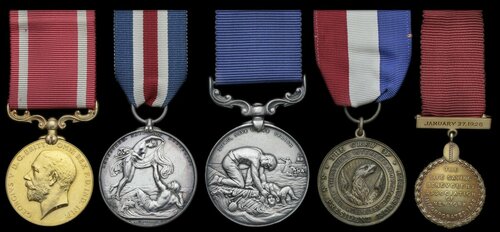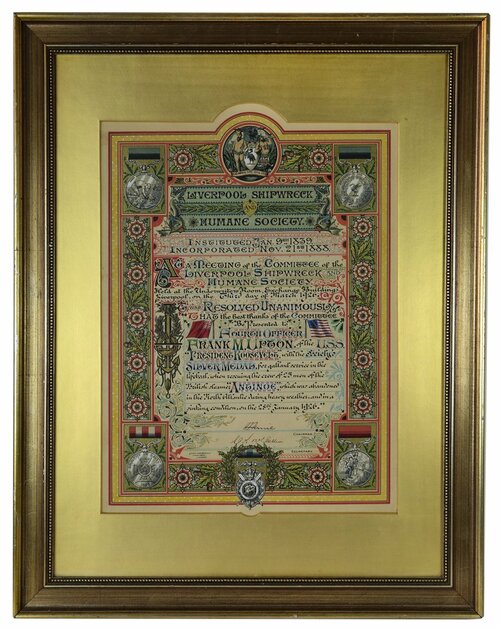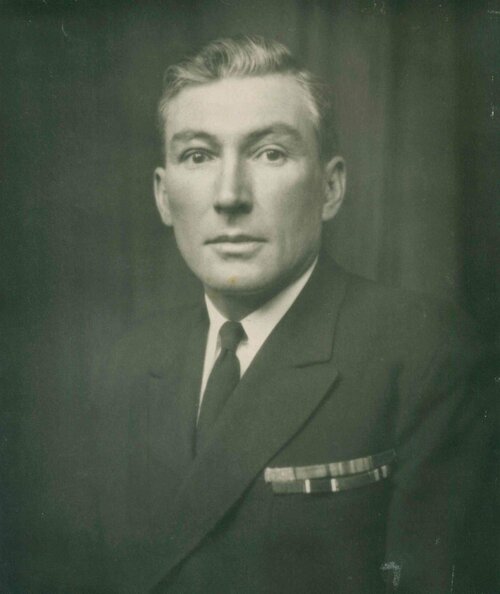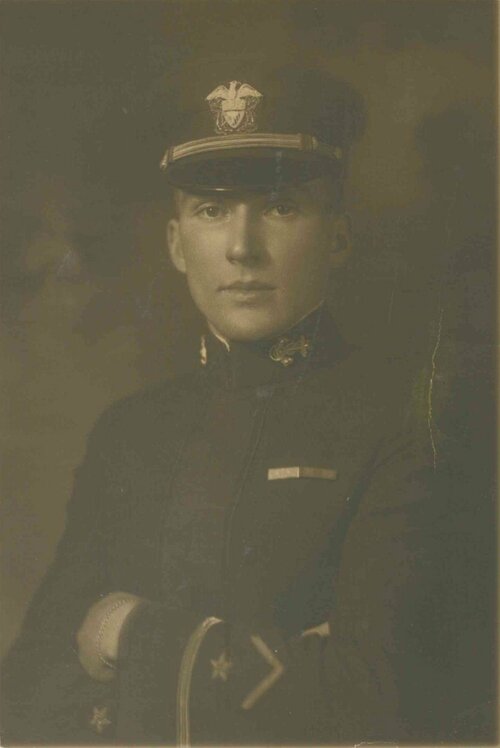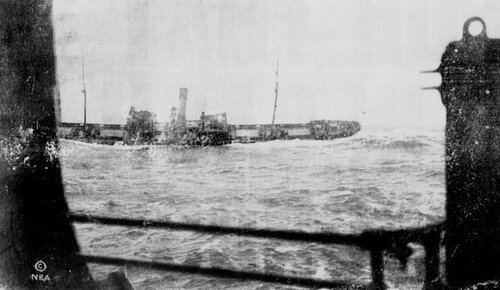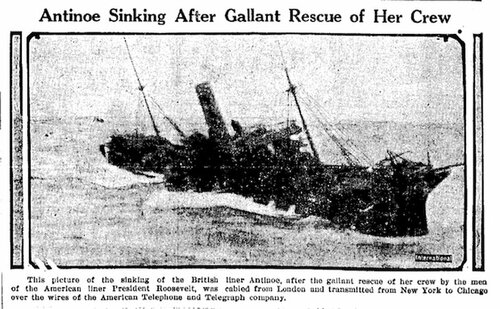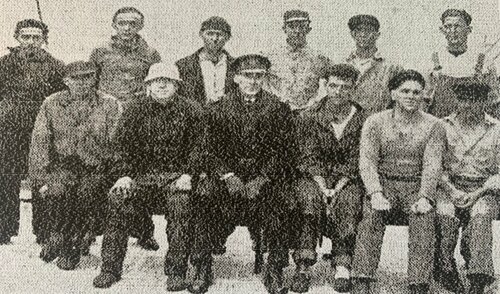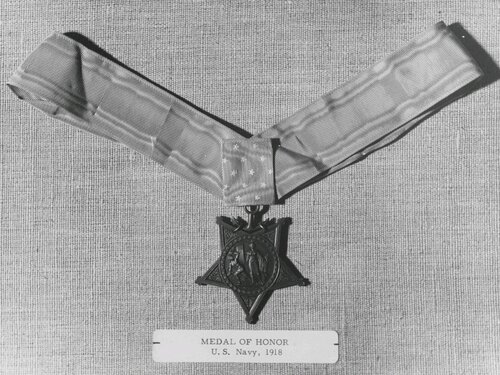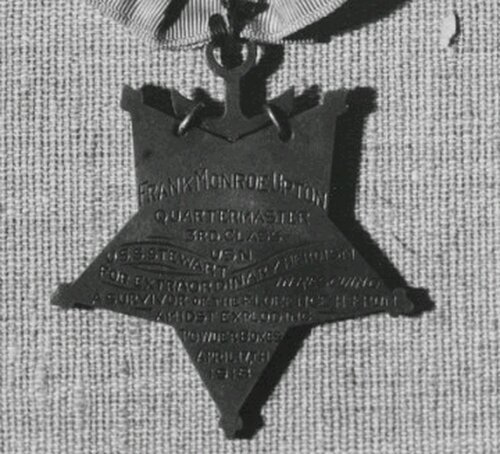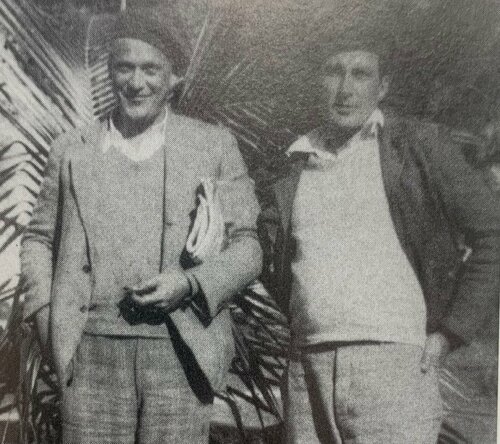Auction: 21003 - Orders, Decorations and Medals
Lot: 477
The superb Gold Sea Gallantry Medal group of five awarded to Ensign F. M. Upton, United States Navy, the recipient of the Congressional Medal of Honor (Navy) for the Great War, who was further decorated with the Lloyd's Medal, Liverpool Shipwreck Marine Medal and New York Lifesaving Gold Medal for his gallant part in the wreck of the Antinoe in January 1926
Sea Gallantry Medal (Foreign Services), G.V.R., gold (Frank M. Upton. "Antinoe." 25th-28th January. 1926.); Lloyd’s Medal for Saving Life at Sea, 2nd small type, silver (Fourth Officer Frank M. Upton. S.S. "Antinoe" 24th to 28th January 1926.); Liverpool Shipwreck and Humane Society, Marine Medal, 3rd type, silver (To 4th Officer Frank M. Upton. For Gallant Service, 24/28 Jany. 1926.); Lifesaving Benevolent Association of New York, gold (marked 14 carat) Medal, by Tiffany & Co., the reverse named 'Frank M. Upton' and the suspension bar 'January 27, 1926'; Allied Theatrical Interests and Neptune Association Medal to the Crew of S.S. President Roosevelt 1926, 32mm., bronze, reverse inscribed (name engraved), ‘Presented to Frank Upton in recognition of Gallantry and Humanity in connection with the rescue of the S.S. Antinoe Feb. 19 1926’, good very fine (5)
[Congressional Medal of Honor] Colorado G.O. No. 403 of 1918:
'For extraordinary heroism following internal explosion of the Florence H, on 17 April 1918. The sea in the vicinity of wreckage was covered by a mass of boxes of smokeless powder, which were repeatedly exploding. Frank M. Upton, of the U.S.S. Stewart, plunged overboard to rescue a survivor who was surrounded by powder boxes and too exhausted to help himself. Fully realizing the danger from continual explosion of similar powder boxes in the vicinity, he risked his life to save the life of this man.'
20 gold Medals were awarded by the Board of Trade for this dramatic rescue which attracted much international interest at the time. The gold Medals together with various presentation pieces for the officers were all presented on board the President Roosevelt at Southampton on 6 February 1926. Those to Wirtanen and Heitman, both deceased, were handed to Captain Fried.
Frank Monroe Upton was born in Loveland, Colorado on 29 April 1896. Perhaps the best biography is offered by the US Naval History and Heritage Command:
'He enlisted in the U.S. Navy from that state [Colorado] and served as a Quartermaster on the destroyer Stewart during World War I. On 17 April 1918, while his ship was serving on escort duty in Quiberon Bay, France, the nearby American steamship Florence H suffered an internal explosion. Though the sea in the vicinity was covered by exploding boxes of smokeless powder, Upton dove into the water and rescued an exhausted survivor. For his "extraordinary heroism" on this occasion, he was awarded the Medal of Honor.
In December 1918, Upton was commissioned as an Ensign in the Naval Auxiliary Reserve Force. Upon completion of his military service, Upton became an officer in the U.S. Merchant Marine. In January 1926, while serving as a Fourth Mate of the U.S. passenger liner President Roosevelt, he participated in the rescue of the crew of the British freighter Antinoe, which was breaking up in the North Atlantic. Upton, along with the others involved, were awarded the King George V Gallantry at Sea Medal [Gold} by the British Government and were given a ticker-tape parade in New York City. During World War II, as master of a merchant ship, he voyaged to Murmansk, Russia, the Persian Gulf, and West Europe, and took part in the 6 June 1944 D-Day Landings at Normandy. After his Merchant Marine service, he relocated to Boulder, Colorado and operated a motel.'
Good insights into the persona of Upton are offered in Whistled like a Bird, which features large extracts from his first wife, Dorothy Putnam:
'Upton up here all day and overnight, after two years silence and disappearance [having been at sea]. He's nice as ever G.P. to town to go over movies etc...an odd duck, perfectly simple and single track...yet he somehow gives an impression of depth and contradictoriness which isn't there. If he had better teeth, he'd be a very stunning man, very much a 'mere male' tho.'
His service in the Great War, with his award of the Congressional Medal of Honor, one of just 121 for the Great War of which 21 went to the Navy, is quite remarkable. The actions displayed in 1926 further added to his laurels.
To save the Antinoe - Sea Gallantry Gold
The New Egypt & Levant Steamship Company freighter Antinoe, 3,747 tons, was en-route from New York to Queenstown, with a cargo of grain, under the command of Captain Harry Tose with a crew of 25. On 23 January 1926 having run into a heavy gale, she was struck by an extremely large wave. The wave burst upon the vessel damaging the steering gear and engine, and carried away the dingy. Becoming unmanageable and developing a list an S.O.S. message was broadcast. The call was received by Newfoundland and relayed, being picked up by the R.M.S. Aquitania which passed it on to the President Roosevelt of the United States Line, under the command of Captain Fried. The President Roosevelt made contact with the Antinoe at 12.30 on 24 January. After pumping oil into the sea she attempted to launch a boat. This ended in tragedy as the boat was smashed against the sides of the ship and two of the crew were drowned. At 9p.m. the weather worsened, and in violent snow squalls, the two ships lost touch. Over 18 hours later through the skill and perseverance of Captain Fried the President Roosevelt regained contact with the Antinoe. In the interim, the situation of the ship had deteriorated, with a derrick breaking loose and causing damage and the engines completely stopped. In this perilous situation Captain Tose decided to abandon ship. Five successive attempts were made by the President Roosevelt to drift lifeboats down to the Antinoe attached to a line, each without success. Similarly, attempts to send a line by rocket also failed.
On 26 January more oil was distributed but the weather was too severe to permit a boat to be sent away and attempts were made to reach the Antinoe with lines but without success. It was possible, however, on 27 January to get another boat away, the weather having moderated and in charge of Mr Miller and manned by 3rd Officer Sloan, 4th Officer Upton, Wall, Beers, Wilke, Fugelsang, Fisher, Riedel and Caldwall, this boat got away about 7.20p.m. and after very great difficulty reached the Antinoe and took off 12 survivors who were in a pitiful condition.
Again, on 28 January about 12.40a.m. another boat was sent away, Chief Officer Miller being once more in charge, with a crew comprising Upton, Wall, Diaz, Araneda, Alberts, Hahn and Roberts. There was a heavy sea running, but the wind had dropped considerably, and by the light of the moon, the Antinoe was reached and the 13 remaining survivors taken off. Nearly 4 days were occupied in rendering these services and the President Roosevelt lost 6 lifeboats. The Antinoe was abandoned and left to sink.
The Captain and crew of the President Roosevelt were the recipients of the thanks of the British Government and the congratulations of the Admiralty. A letter of thanks was also sent by King George V to President Coolidge. The owners of the Antinoe made a presentation to Captain Fried and his men. (Dictionary of Disaster at Sea, refers). Captain Fried was awarded the Navy Cross for this action, whilst Upton was presented a silver salver to go with his gold Medal and other awards. Footage from British Pathe can be viewed via:
https://www.youtube.com/watch?v=Of6I5IRQJ1U
In the period 1911-37 a total of 44 Medals were awarded in gold. With the exception of the Albert Medal (1st class) this is the only official bravery Medal awarded in gold.
Back with Dorothy, Upton was lucky not to lose his hand in 1929 when it was trapped in a propeller. Bandaged up, he and Bill Lancaster flew from the East Coast to Cleveland to see the air race there (Ibid). It was clear Upton wanted to marry Dorothy, for she was an heiress with means, indeed he was flying solo and doing acrobatics just a few weeks after getting behind the controls. The pair were married by 1930, but cracks soon appeared, no doubt as a result of the scenes he had seen in action in the previous years. On 4 February 1934, he had argued with his wife and continued drinking alone at a bar. She saw his car pull back home and expected that the arguments would continue but instead:
'Brought home at 10pm...Doctors. Blood. He shot him twice in the head, but too drunk to be aimed right. Bed, two Doctors. Loss of blood. I shall be 24hr Nurse.'
With Upton lucky to survive this attempted murder, the pair eventually divorced, it was clearly not a love match. Upton returned to the fold during the Second World War. He died on 25 June 1962 and is buried in Arlington National Cemetery, Virginia (Section 8, lot 55-A).
Sold together with his superbly ornate illuminated Certificate for the Liverpool Shipwreck and Humane Society Marine Medal, a copy of the book from which quotes have been taken and copied research.
His Congressional Medal of Honor is held by the Congressional Medal of Honor Society, Mount Pleasant, South Carolina.
Subject to 20% VAT on Buyer’s Premium. For more information please view Terms and Conditions for Buyers.
Estimate
£6,000 to £8,000
Starting price
£5500

